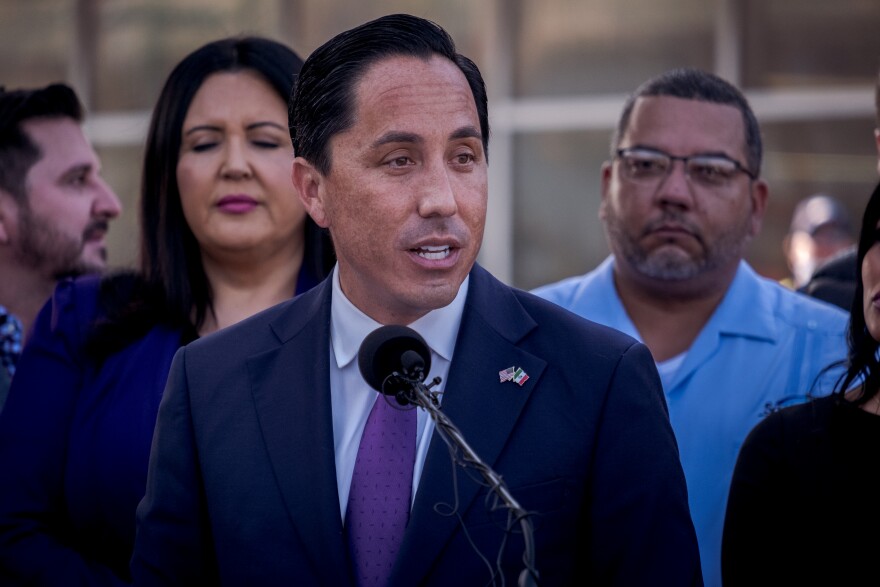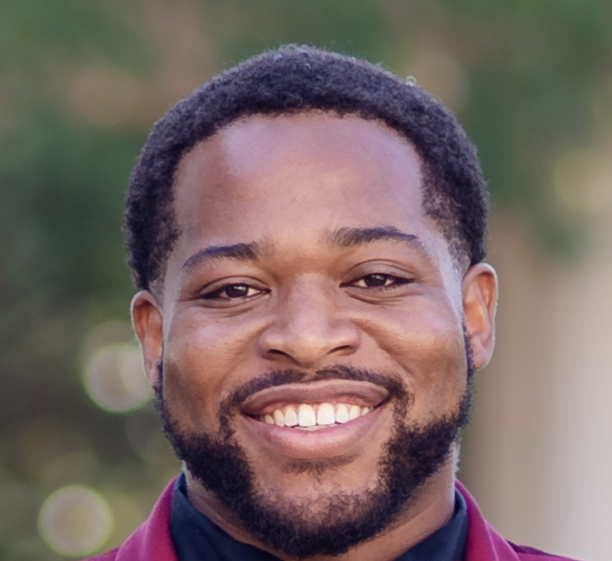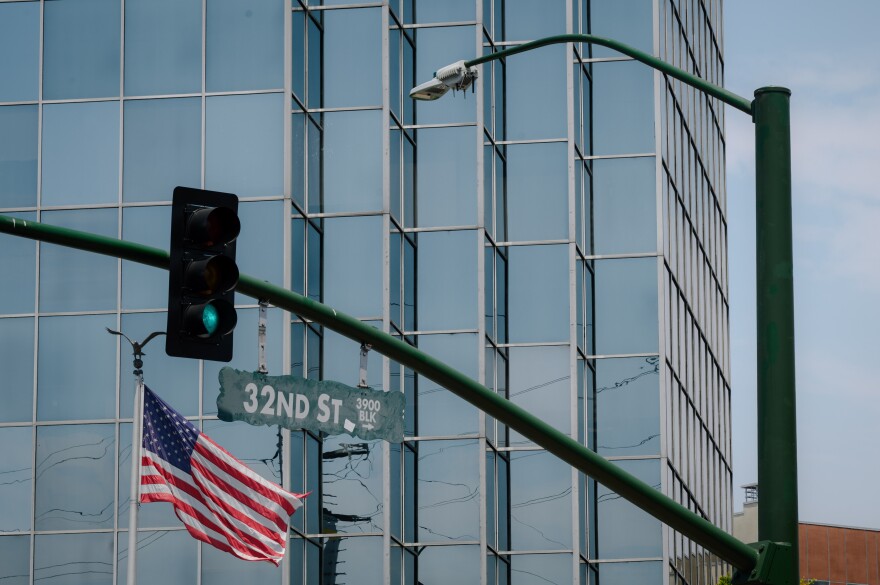Membership on San Diego's Privacy Advisory Board — the civilian oversight panel that monitors the city's use of surveillance technology — has dwindled to the point where meetings can't be held because it lacks a quorum.
As a result, the city's use of certain surveillance equipment is not facing independent scrutiny. Privacy advocates who spoke to KPBS blame Mayor Todd Gloria, and one former member of the board went as far as to say his administration is purposely delaying appointments to the nine-member body to stifle oversight.
The disintegration of the board comes at a pivotal moment. Last week, the San Diego Police Department announced two controversial changes to its so-called “smart streetlights” program, which embeds cameras and license plate readers in neighborhoods to aid criminal investigations.
The department wants to ease requirements on the placement and relocation of cameras throughout the city and plans to fast-track the rollout of cameras in the Hillcrest neighborhood ahead of the city’s Pride Festival this weekend.
For months, Privacy Advisory Board chair Ike Anyanetu has warned city leaders about the impacts of the resignations. He repeatedly inquired about seating new members to ensure oversight would continue, according to documents reviewed by KPBS.
“Where are the appointments?” he said during a recent interview. “That’s the real story.”
Under the city’s municipal code, the mayor is responsible for appointing members to the board. But so far this year, Gloria has not sent any appointees to the City Council for confirmation.
Rachel Laing, a spokesperson for Gloria, declined KPBS’ request to interview the mayor. She confirmed the mayor’s office received 12 applications for the Privacy Advisory Board in the last year. However, only three candidates have been interviewed in the last six months.
When asked why Gloria hasn’t filled the vacancies, Laing said in an email that appointees must meet “very specific and prescriptive seat qualifications” and the positions demand “an extensive amount of work.”
“All of these factors mean we have a very narrow pool of applicants,” she wrote, but did not state how many of the dozen applicants failed to meet the necessary qualifications.
Gloria has been a vocal critic of San Diego’s surveillance oversight ordinance, which the City Council passed in 2022. The ordinance requires city departments to provide detailed information about their surveillance equipment to the Privacy Advisory Board; the board then gives recommendations to the City Council on how the technology should be used, if at all.

“While we can acknowledge the privacy ordinance has a right and noble goal…we cannot allow this to grind our city operations to a halt,” he said at a press conference in October. “And we cannot allow it to jeopardize public safety.”
Last year, Gloria successfully lobbied the City Council to push back the deadline to review all of the city’s existing surveillance equipment. Originally, the city had one year to complete the process; now, it will have four years. In January, the mayor pushed through another amendment to the surveillance oversight ordinance that exempts police databases and other equipment from review.
City departments, many under Gloria’s purview, have identified hundreds of existing surveillance technologies, but few have sent items to the Privacy Advisory Board for review.
Albert Fox Cahn, executive director of the New York-based Surveillance Technology Oversight Project, expressed dismay at the situation in San Diego.
“It’s not only bad for civil rights, but it’s bad for democracy,” said Cahn, whose organization advocates for privacy rights and curtailing mass surveillance systems. “It’s really disappointing after all the amazing work that went into establishing this oversight and accountability requirement.”
Vacancies pile up
The empty seats added up quickly.

Between February and April, the Privacy Advisory Board lost three members. Anyanetu said member health issues and frustration with the city contributed to the resignations.
And then in June, Khalid Alexander, president of social justice nonprofit Pillars of the Community, submitted his resignation. His vacant seat left the board without a quorum, meaning it could no longer meet and conduct official oversight business.
In his resignation letter, Alexander wrote about his deep respect for the board and its members, but felt disheartened by the actions of city leaders.
“A majority of today’s Council members, often under pressure from the Mayor, have repeatedly chosen to dismiss the expert advice of this board in favor of ‘law enforcement’s’ endless appetite for surveillance technology,” he wrote.
In an interview, Alexander said he believes city leaders are refusing to appoint new board members as a backdoor strategy to scuttle oversight.
“I think it's intentional,” he said. “I'm not very surprised, honestly, that [the mayor has] been dragging his feet to appoint new people.”
In response, Laing reiterated in an email that “these seats are incredibly difficult to fill despite our best efforts” and added “it’s in the City’s best interest” to appoint members to the board.
In April, the board had to nix its meeting at the last minute when one of its members couldn’t attend. The board canceled its June and July meetings because it no longer has a quorum. Its next scheduled meeting in September is up in the air.
With the board sidelined, Anyanetu said, “It's putting the privacy of the public at stake.”
Applicants waiting
TRUST SD Coalition, a privacy rights organization composed of community groups, has reached out to several potential candidates to apply for the vacant seats.
That includes Brett Diehl, an attorney in San Diego.
“It's important that the board continues to exist,” Diehl said in an interview. “It's my hope that either myself or other individuals who apply are named to the board, so that a full quorum can be reached.”
Diehl reached out to the City Council twice in April to inquire about serving on the Privacy Advisory Board. Both emails went unanswered.

In June, he submitted an application to the city. He hasn’t heard back yet.
While the mayor is primarily responsible for appointing members to the board, the City Charter states “the (City) Council shall make such appointments” after a vacancy has been unfilled for at least 45 days.
City Council President Sean Elo-Rivera declined an interview request through a spokesperson and did not address the City Charter’s 45-day requirement in an emailed response.
“It is so important for vacancies to be filled by people with both the technical knowledge to provide expert guidance and the ability to serve on the Board dependably for a sustained period of time,” Elo-Rivera said in an emailed statement. “I have and will continue to put personal time and effort into encouraging interested and qualified members of the public to seek an appointment.”
The board has specific criteria for its nine seats. One member, for example, must be a computer hardware or encryption professional. Another must be a certified public accountant or auditor.
The city’s boards and commission website shows the attorney/legal scholar seat is vacant — a position Diehl believes he is qualified for.
Laing, the spokesperson for Gloria, said the mayor’s office does community outreach via social media, its newsletters and referrals from the board. However, she did not provide documentation, links or specific examples of outreach efforts in response to a request from KPBS.
Smart streetlights
The creation of San Diego’s surveillance ordinance and the Privacy Advisory Board can be traced back to the city’s initial, bungled rollout of smart streetlights in 2016. The camera-equipped devices were supposed to save on energy costs and monitor traffic patterns. But soon, they became an investigative tool for SDPD — without the public’s knowledge.
Outcry ensued and the streetlight cameras were eventually shut off. And then in 2022, the City Council passed the Transparent and Responsible Use of Surveillance Technology (TRUST) Ordinance and created the Privacy Advisory Board.
Under the ordinance, city departments must identify potential surveillance technologies and produce reports on their use and impacts. The departments are also required to hold community meetings and submit the technologies to the Privacy Advisory Board for review. The board then has 90 days to send their recommendations to the City Council, which has final approval.
In early 2023, Gloria and SDPD began pushing a new rollout of the smart streetlights program specifically designed to assist police with investigations. The streetlights were the first item to pass through the city’s surveillance review process.

“The No. 1 job of city government is to ensure residents are safe in their communities,” said Gloria in a statement announcing his approval of the revived program.
Privacy advocates and members of the advisory board have raised concerns about the use of the camera-equipped streetlights, which can also automatically read license plates.
SDPD said the program has already helped officers apprehend suspects in cases involving kidnappings, thefts and a drive-by shooting, among other incidents.
Now, the department is pushing to loosen requirements on where it can place the cameras. Currently, SDPD must identify a specific light pole. Under a new plan, they want to identify zones measuring roughly 16 square blocks to place the cameras. When the cameras are placed or moved, their location will be updated in the city’s interactive map.
The department presented its proposal to the Privacy Advisory Board at its last meeting in May. With the June and July meetings canceled, however, the board won’t have an opportunity to review the proposal within the 90-day window and provide feedback. Instead of waiting for that review period to lapse, SDPD decided to bring the proposal to the City Council’s Public Safety Committee last week.
SDPD Captain Jeff Jordon said the department got the greenlight from the City Attorney’s Office to bring the proposal forward. He argued there is too much risk in waiting.
“Are we going to turn a blind eye and allow crime to continue and not make use of the(se) tools?” Jordan said in an interview. “How would I defend this?”
During the Public Safety Committee hearing, Anyanetu stood at the podium and weighed in on the proposed changes.
“Are we actually putting (community) members in more vulnerable positions?” he posited to the councilmembers.
The committee approved the proposal, which now heads to the full City Council for a vote.
‘Exigent circumstances’
Separately, SDPD is advancing a plan to roll out 14 smart streetlight cameras in the Hillcrest neighborhood ahead of San Diego’s Pride Festival, which begins this weekend.
The department is fast-tracking the deployment citing “exigent circumstances,” which allows for the use of surveillance equipment without going through the standard approval process if there is an imminent danger to members of the public.
Specifically, SDPD cites a 73% increase in reported hate crimes in San Diego from 2022 to 2023, including a sharp uptick in incidents against the LGBTQ community. The department also highlighted a recent string of pellet gun drive-by shootings in Hillcrest that targeted popular gay bars.
“With the rise in hate crimes and our upcoming annual Pride parade and festival, we want to leverage this technology to protect our LGBTQ community,” said Chief Scott Wahl in a statement.
Without a quorum, the Privacy Advisory Board cannot provide official recommendations for the expedited camera deployment. At Wednesday’s meeting, several commenters objected to SDPD’s use of additional surveillance equipment in Hillcrest.









